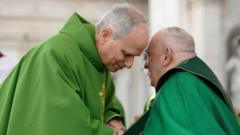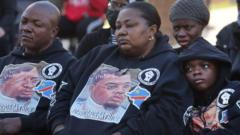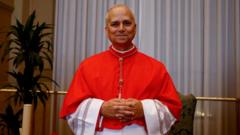The release of the first batch of prisoners marks a significant gesture from the Cuban government in the context of its recent diplomatic engagements with the United States, specifically under President Biden's administration. In a move to ease diplomatic tensions, the US removed Cuba from its list of state sponsors of terrorism, which has awarded the Cuban government a level of recognition and sanction relief. Among those released was Dariel Cruz García, who expressed relief at being able to reunite with his family after enduring years of imprisonment for his political activism.
Cuba Begins Releasing Anti-Government Protesters Amid US-Catholic Church Agreement

Cuba Begins Releasing Anti-Government Protesters Amid US-Catholic Church Agreement
Cuba has initiated the release of approximately 553 prisoners, many detained during the 2021 anti-government protests, following a controversial agreement with the US brokered by the Vatican.
The release of these prisoners is viewed through numerous lenses, highlighting varying perspectives on human rights, international relations, and the shifting dynamics in US-Cuba politics. Local NGOs reported that around 20 of the designated prisoners were set free on Wednesday, including Donaida Pérez Paseiro, who had been sentenced to eight years for her roles in the protests, emphasizing that the government utilized them as "bargaining chips" in diplomatic negotiations.
Despite the emerging optimism surrounding the releases, skepticism lingers regarding the sustainability of the agreement. Former Trump administration officials hinted at potential reversals of any concessions made, suggesting that the future of US-Cuban relations may hinge on the political winds in Washington. While the Cuban government has cautiously embraced the deal, the acknowledgment that those released have neither received amnesty nor a full pardon adds a layer of complexity, as they remain vulnerable to re-arrest under specific conditions.
Families of other prisoners continue to express anxiety as they await confirmation about the status of their loved ones. The emotional strain illustrates the ongoing struggle for political change on the island and the broader implications of diplomatic relations between Cuba and the US.
Ultimately, these developments could potentially reshape the narrative surrounding Cuba's human rights landscape and the relationship with the United States, raising significant questions about accountability, international diplomacy, and the future of civil liberties on the island.
The recently established dialogue between the two nations holds promise for broader policy changes or deeper engagement. However, political volatility and historical tensions illustrate that the path forward remains fraught with challenges due to differing agendas and socio-political complexities.
In summary, the release of a significant number of political prisoners marks an important milestone in US-Cuban relations but raises questions about the durability of diplomatic engagements and the human rights situation within Cuba.
Despite the emerging optimism surrounding the releases, skepticism lingers regarding the sustainability of the agreement. Former Trump administration officials hinted at potential reversals of any concessions made, suggesting that the future of US-Cuban relations may hinge on the political winds in Washington. While the Cuban government has cautiously embraced the deal, the acknowledgment that those released have neither received amnesty nor a full pardon adds a layer of complexity, as they remain vulnerable to re-arrest under specific conditions.
Families of other prisoners continue to express anxiety as they await confirmation about the status of their loved ones. The emotional strain illustrates the ongoing struggle for political change on the island and the broader implications of diplomatic relations between Cuba and the US.
Ultimately, these developments could potentially reshape the narrative surrounding Cuba's human rights landscape and the relationship with the United States, raising significant questions about accountability, international diplomacy, and the future of civil liberties on the island.
The recently established dialogue between the two nations holds promise for broader policy changes or deeper engagement. However, political volatility and historical tensions illustrate that the path forward remains fraught with challenges due to differing agendas and socio-political complexities.
In summary, the release of a significant number of political prisoners marks an important milestone in US-Cuban relations but raises questions about the durability of diplomatic engagements and the human rights situation within Cuba.





















